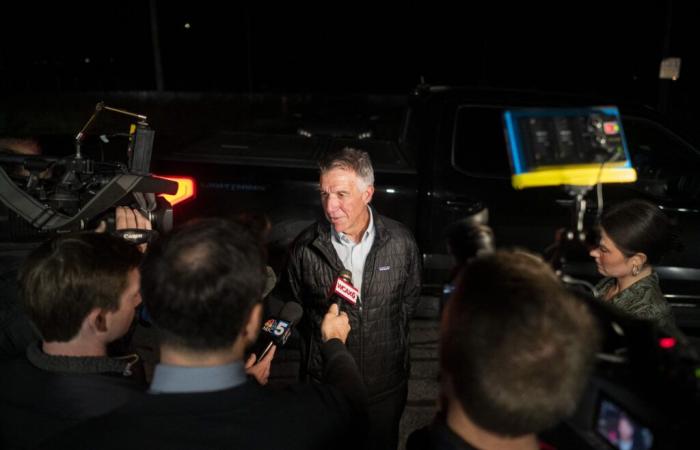Vermonters want two more years of Gov. Phil Scott.
The Associated Press called the four-term Republican’s victory just after 7:30 p.m. Tuesday night, less than an hour after the polls closed.
The Associated Press called the four-term Republican’s victory just after 7:30 p.m. Tuesday night, less than an hour after polls closed in Vermont. Scott faced a challenge from Democratic political newcomer Esther Charlestin, an education consultant from South Burlington.
That’s despite the fact that former President Donald Trump — who remains deeply unpopular in Vermont — led the Republican ticket.
In 2020, Vermont delivered Democratic President Joe Biden his largest margin of victory in the country — and elected Scott with a 40-point lead over his then-Democratic opponent, Lt. Gov. David Zuckerman.
Scott was widely expected to easily cruise to reelection. Two days before Election Day, the University of New Hampshire’s Green Mountain State Poll reported that out of 1,191 voters surveyed between Oct. 29 and Nov. 2, 65% said they supported Scott’s bid for a fifth two-year term.
The poll also showed that Scott enjoys support from voters across the political spectrum. Vermont does not conduct party registration, but the state’s self-described liberals were evenly split in their support for Scott versus Charlestin, according to the survey center. The vast majority of those who described themselves as politically libertarian, conservative or moderate supported Scott (98%, 88% and 88%, respectively), while 67% of those who described themselves as progressives and 62% of self-described socialists said they supported Charlestin.
Of respondents who said they supported Harris for president, 55% said that they also supported Scott for governor.
Frequently polling as the nation’s most popular governor, Democratic operatives in recent years have largely written Scott off as unbeatable. Former Democratic Gov. Howard Dean — now Vermont’s only governor in recent history to have secured more terms at the ballot box than Scott — publicly mulled a political comeback to challenge Scott this year.
But even Dean backed off, telling reporters in May that he would have to resort to a “scorched earth, negative attack campaign” in order to unseat Scott. The entire (hypothetical) affair, he predicted, “would have been a $2 million race on each side, easily.”
“In any race against an incumbent — popular or not — your first job is to convince people that the incumbent doesn’t deserve to be reelected, and that story has not been told,” Jim Dandeneau, the Vermont Democratic Party’s executive director, said at the time.
Ultimately, only two Democratic candidates stepped up to the challenge: Charlestin, and her primary opponent, Peter Duval, a former Underhill selectboard member who previously ran statewide as a Republican. Scott also faced two independent challengers — Kevin Hoyt of Bennington and Eli “Poa” Mutino of Barre — and one opponent from the Peace and Justice Party, June Goodband of Springfield, this election.
When Charlestin won August’s Democratic primary, she became Vermont’s first woman of color to represent a major party on the gubernatorial ballot.
At the time, she told VTDigger that she planned to “go hard” campaigning for Vermonters’ votes: “That means raising a lot more money. That means knocking on doors. That means seeking endorsements.”
Charlestin’s gubernatorial campaign did not go exactly as she anticipated on that August night. According to her final campaign finance report filed to the Secretary of State’s Office on Nov. 1, Charlestin raised $56,692 in the entire course of her campaign cycle.
Scott’s campaign fundraising total for the cycle, as of Nov. 1 was $343,632. That’s more than six times what Charlestin raised.
On the campaign trail, Scott rarely threw punches at Charlestin. Instead, he zeroed in on legislative Democrats as his political foes.
Last election, in 2022, Democrats in both Vermont’s House and Senate secured two-thirds majorities — enough seats to, in theory, easily override Scott’s frequent gubernatorial vetoes. In the ensuing two years, Democrats forged ahead with their legislative priorities, ones they knew Scott opposed, such as a bill to move towards establishing a clean heat standard. As Scott eagerly exercised his veto authority, legislators frequently retorted with decisive override votes.
On the debate stage and in interviews with VTDigger, Scott conceded that he does not believe that Vermont is better off now than it was two years ago, when he last won the race to serve in the state’s most powerful position. But the blame for that, he argued, rests not with him, but with Democrats in Montpelier.
This story will be updated.






